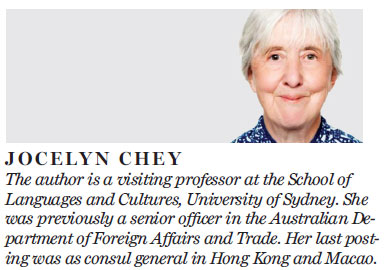The case for protecting and promoting Cantonese
Updated: 2015-07-27 07:43
By Jocelyn Chey(HK Edition)
|
|||||||
Remembering that the British assumed for centuries the whole world should speak English, I note that these days many Chinese assume that everyone the length and breadth of the country should speak Putonghua.
In the case of Hong Kong, there are many reasons for protecting and promoting Cantonese. The 2011 Girona Manifesto on Linguistic Rights, building on the earlier Universal Declaration of Linguistic Rights submitted to UNESCO in 1996, sets out the principles. Describing linguistic diversity as world heritage, it stresses that respect for all languages and cultures is fundamental to dialogue and peace. It says that language is "the heart of a community that gives culture and identity". People who know more than one language are more likely to be intellectually open and understanding.
The universal declaration and the manifesto are careful not to define what exactly is meant by "language", whether regional or national or dialect. This is often a sensitive political issue. Modern history provides many examples of national governments that have tried to effect national unity through linguistic conformity. The Franco regime in Spain sought to abolish the regional Catalan language, for instance. Yet there are also flourishing multilingual countries that recognize the importance of preserving regional languages and cultures. Indonesian people, for instance, value highly their regional cultural heritages and are often bilingual, speaking both their native language and also Bahasa Indonesia.

One of my modest achievements when I was consul-general for Australia in Hong Kong was to gain recognition from the Australian government that Cantonese was indeed a language and not simply a dialect. This is generally recognized by linguistics professionals, based on the criterion that Cantonese and Putonghua are not mutually comprehensible. Furthermore, since Cantonese is the mother tongue of about 60 million people around the world, it is one of the world's major languages, with more speakers than Thai or Polish or Dutch. What happens to Cantonese certainly matters!
But Putonghua education is rising. In 2008 the Standing Committee on Language Education and Research launched a pilot program for schools to adopt Putonghua when teaching Chinese language. A SAR government program of financial support and guidance to schools to help them switch from Cantonese to Putonghua operated until 2014. Around 70 percent of all schools now teach Putonghua as a separate subject as well as Chinese language courses in Putonghua. In April, the Legislative Council's education panel described the teaching of Putonghua in Hong Kong schools as "a long-term and developmental target".
If Hong Kong lost Cantonese, it would also lose its joie de vivre. Colloquial Cantonese is racy and may have the world's greatest selection of profanities. It also encapsulates local folklore and cultural memories, and is not simply a colloquial language. Cantonese opera dates back to the Ming Dynasty (1386-1644), making it as much a part of China's cultural history as Shakespearean drama is of Britain's. When Cantonese people emigrated in the 19th century they took opera shows with them. The Chinese Museum in Melbourne exhibits a tent theater as used on the Victorian goldfields for the entertainment of Chinese miners. Hong Kong movies, once appealing only to local and expatriate Chinese, are now mainstream, and their Cantonese-speaking stars are household names around the world.
Earlier this month I spoke at an international conference about some aspects of humor in Cantonese proverbs, making the point that humor, which has many uses in society, is a particular feature of communities and cultures that are being marginalized. I received positive comments on my paper from people who had studied similar language groups such as Guernsey patois speakers, who are resisting the encroachment of both the English and French languages. The "nudge, nudge, wink, wink, know what I mean?" type of joke binds groups together and helps to build a defence against apparently unassailable greater outside forces. Ah To's illustrated landscapes of Cantonese proverbs, which have recently gone viral on the Internet, are an example of this kind of local humor.
I am sure Hong Kong's education officials mean the best for students in their care, and are conscious of the importance of high standard Putonghua language ability for day-to-day and professional use. Over and above this, however, is the importance of preserving the unique cultural heritage of Hong Kong and its neighboring counties in Guangdong province. Clearly, the people of the region continue to cherish their language, its wit and its flavor.
(HK Edition 07/27/2015 page9)